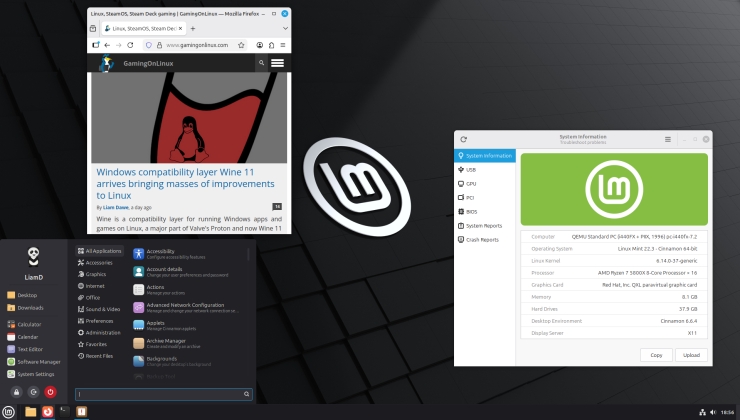We may potentially be in for some big changes in Fedora 44, with plans in place being discussed to drop 32-bit multilib / i686 packages.
I hope they remember what happened when Canonical planned the same for Ubuntu, when Valve jumped in to note they would no longer recommend Ubuntu and then Canonical backtracked on it. Linux distro developers may not like it, but Steam is huge and requires 32-bit to work properly for the client and for Proton / Wine.
This is only a proposed change for Fedora 44 onwards, it has not yet been approved. They're having a vote on the Fedora Forum where the change is being discussed. Even if it's approved, Steam wouldn't be the only problem, there's no doubt various other apps, tools and games that would break with such a huge change. At least with the Wine 9.0 release, WoW64 saw a huge improvement for running 32bit games on a full 64bit system.
The Fedora developers do at least note in the proposal that Wine and Steam are part of the dependencies on this, so they are thinking it through and aware of the issues.
Changes like this might push Valve to move a little quicker to adapt Steam to full 64bit, but I wouldn't expect anything ready any time soon. Especially when you look at Valve's own stats where Fedora doesn't even register in the top 11 distributions used on Steam. Although, we don't know what distros make up the 7% for the Steam Flatpak - but that's not supported by Valve anyway.
What are your thoughts?
Update 12:52 UTC - in response to some replies on their forum, the developer who proposed the change made it clear that eventually it will have to happen:
This is why it’s a proposal, and why I filed it more than 6 months earlier than strictly required.
But just to clarify - we will need to drop support for 32-bit x86 at some point. It’s dead, and more and more software just doesn’t support being built and / or run in 32-bit environments at all.
Yes, some things will stop working. But I hope that we can provide solutions and / or workarounds for most use cases.
And it’s better to start planning for the removal of i686 packages now than when (insert foundational package here - for example, CPython) stops supporting 32-bit architectures and we need to scramble to adapt.
Last edited by sudoer on 25 Jun 2025 at 9:47 am UTC
Upstream 32bit versions of applications/libraries started to be unsupported, untested and/or unused by upstream since some time now. "Doing nothing" and maintaining the status quo is worse than difficult: it's dangerous.
Fedora volunteers cannot keep providing a better product downstream than they have access to upstream. As a side note: can we please stop blabbering about corporate greed and for-profit progressism? These are guys helping for free in their free time. It's not IBM, it's not RedHat, it's a different thing. The corporate world abandoned 32bit AGES ago (and support it only in front of quite substantial payments).
Resources are scarce. Whoever is on the roof shouting that we must keep things running like twenty years ago should come down and start helping contributors. Or become one.
Associated projects, like RPMFusion, have the same resource starvation (people/time/interest) as Fedora maintainers, and they wouldn't pick up the slack. After all, it's rather unrealistic to offload one volunteer to overburden another.
Fedora is too small for Valve to care? Maybe. Or maybe this could be the last straw to push Gaben (always be praised His Name) to make Steam 64bit only and including in itself some "soft virtualization" in the form of 32bit runtime environments for abandonware 32bit native games. This wouldn't help extra-Steam native games. But at some point, we should stop complaining we can't run Amiga games without an emulator.
Other important subsystems, like Gamescope and OBS, are equally critical for a modern, gaming-friendly environment. We cannot dictate what others do with their free time, but asking kindly is always an option. And the best option is start contributing actively to the projects to help them get out of 32bit technical debt. That's the beauty of Open Source, after all: not backward compatibility, but technical excellence.
This need to happen, sooner or later. It's a matter of when, not if. It's too early now? Most likely yes. So, when it's the right time? Ubuntu tried it in 2019-2020 and it backfired horribly. But even five years ago, the rationale about letting 32bit die was strong and pressing. We're half a decade later debating exactly the same stuff, with exactly the same problems. https://canonical.com/blog/statement-on-32-bit-i386-packages-for-ubuntu-19-10-and-20-04-lts
Do I have a solution? Of course not. Will I miss some late 90's games unless there's an user-friendly way to run them? Probably. But in all honesty, I have no heart to ask Fedora maintainers (or any other distro maintaner, for that matter) to keep doing this maintenance work forever because Reeee mu games.
Last edited by syylk on 25 Jun 2025 at 10:51 am UTC
But at some point, we should stop complaining we can't run Amiga games without an emulator.Excuse me? I'll kill off every second daemon in my system if that'll let me run A500 games natively! :grin:
This is just moving the problem from outside the Flatpak to inside the Flatpak: If we want to run all those old 32 butt games, they need 32 bit libraries somewhere.That's what the Steam Runntimes and org.freedesktop.Sdk.Compat.i386 are for. 32bit support on 64bit systems.
You do not need a single 32bit library to run 32bit software on 64bit systems with flatpak. Also there is WOW64 for Wine / Proton which is to run 32bit Windows game on 64bit. Even Windows uses 32bit abstractions on 64bit to run legacy software.
Removing 32bit support is not an issue at all.
i recomend this presentation for anyone thinking legacy dont matter, but i dont think its your case:It's not that legacy doesn't matter.
https://www.youtube.com/watch?v=65crLKNQR0E
It's that we do no longer really need legacy itself to keep other legacy alive.
Some things will no longer work, no doubt.
But I'd argue that those things were no longer important to people or someone would've made an effort to modernize or preseve them - just as people did with Flash, which can still be enjoyed without having to have Flash installed (with a bit of effort).
Who knows how many books we lost because nobody ever read them. It happens, it's normal.
That's what the Steam Runntimes and org.freedesktop.Sdk.Compat.i386 are for. 32bit support on 64bit systems.Erm... What is inside of the Steam Runtime and org.freedesktop.Sdk.Compat.i386?
You do not need a single 32bit library to run 32bit software on 64bit systems with flatpak.
Last edited by Eike on 25 Jun 2025 at 5:27 pm UTC
can we please stop blabbering about corporate greed and for-profit progressism? These are guys helping for free in their free time. It's not IBM, it's not RedHat, it's a different thing.Since only two people commented about this, I'm going to assume you're talking about me.
Please slow down and read what I wrote more carefully. I did not say that corporations were directly involved or that the volunteers were corporate flunkies. I said that there is no need for open source volunteers to employ a philosophy developed by a corporate for-profit mentality. A completely different thing.
Besides, how do you know that this issue is not being influenced by IBM or RedHat in some way? If we maintain old things, we do not buy new things.
Resources are scarce.This is precisely why it is so important that the volunteers step up to maintain these old technologies. You know that -- with the possible exception of companies like GOG or Valve -- the for-profit sector is not going to do it. Our society has been devaluing the idea of maintenance against the "convenience" of a throwaway habit that only benefits the for-profit sector -- at the expense of our society, culture and environment. In fact, it is the lack of maintenance that is causing this resource scarcity.
It's too early now? Most likely yes.It is too early. We need to fully develop and deploy the containers, runtimes and technologies like WOW64 that enable 32-bit apps to run in a 64-bit environment before we abandon the libraries needed to run them right now. Honestly, even in the corporate world, there are businesses that still utilize Windows XP or Windows 98 because of a critical application that absolutely will not run in modern operating systems.
Do I have a solution?For now, IMO, the solution is to continue supporting 32-bit libraries. Which, of course, means that we will see more reviews such as this one popping up periodically in the future.
The macOS client was recently ported to aarch64 (a completely different CPU architecture!). If an x86_64 build is harder than that then Valve should completely rewrite the Steam client.As I pointed out earlier, Steam client is 64 bit on macOS for both x86-64 and ARM64, yet it is still not fast. The problem is CEF, as long as CEF remains as it is, changing and/or upgrading architecture won't change much.
As I pointed out earlier, Steam client is 64 bit on macOS for both x86-64 and ARM64, yet it is still not fast. The problem is CEF, as long as CEF remains as it is, changing and/or upgrading architecture won't change much.x86_64 is not about performance, it's about compatibility. It shouldn't be slower than x86 (if it is then I again suggest Valve rewriting the whole client).
And aarch64 was only recently released as a beta. Currently it runs the x86 client via Rosetta2 which simply is slower. The aarch64 port is much faster (check the various user reports).
This is precisely why it is so important that the volunteers step up to maintain these old technologies. You know that -- with the possible exception of companies like GOG or Valve -- the for-profit sector is not going to do it.We're only talking about this because Valve seems too incompetent to fix their crapware. Instead you're blaming all other to fix Valve's stupidity. They're not supporting the old technologies, Steam requires an x86_64 CPU. If they want to support x86 binaries (instead they could move all games to Proton, too), they can provide their x86 runtime. No need for all others to do their job.
It is too early. We need to fully develop and deploy the containers, runtimes and technologies like WOW64 that enable 32-bit apps to run in a 64-bit environment before we abandon the libraries needed to run them right now.x86_64 is ancient. People are already striving to move to the next, more efficient architectures (aarch64 & Risc V). We already can run x86 software without any problems in containers but generally don't need to: "Our" software is build for x86_64 by the distributions. Again, it's only crapware from crap developers which blocks this.
For now, IMO, the solution is to continue supporting 32-bit libraries.Nobody is stopping you, have fun: https://docs.fedoraproject.org/en-US/infra/sysadmin_guide/copr/
x86_64 is ancient. People are already striving to move to the next, more efficient architectures (aarch64 & Risc V). We already can run x86 software without any problems in containers but generally don't need to: "Our" software is build for x86_64 by the distributions. Again, it's only crapware from crap developers which blocks this.I really don't want to sound cynical but this makes me one. I keep reading about the wonders of Risc-v for at least 5 years, yet I am yet to see a working distro running all the legacy i386 apps and games that works seamlessly on risc-v.
I use Linux exclusively since 2009, I was reading about the heavens offered by Wayland even that early. Yet, we are witnessing its mass adoption in last couple years. Why? Because, some smart people didn't arbitrarily decide to drop x11 that would render old apps inoperable due to lack of efficient translation.
Nobody is stopping you, have fun: https://docs.fedoraproject.org/en-US/infra/sysadmin_guide/copr/Also, no one is stopping people to switch to other distros either. Unless its name is Debian, there is no irreplaceable distro. Have fun seeing people migrating to distros offer better and native compatibility.
. . . Of which there is probably quite a bit. Specifically relevant to this forum, nearly all older games are "unmaintained legacy software".Certainly. But running old, unmaintained software is what emulators are for.
This discussion is more and more interesting.
Honestly, even in the corporate world, there are businesses that still utilize Windows XP or Windows 98 because of a critical application that absolutely will not run in modern operating systems.There is no such thing as a critical software application that could not be rewritten, emulated or ported. Hell, even COBOL is somehow finally on its way out.
Ending life support for old environments is exactly what forces those crusted structures to renew themselves.
Otherwise, we'll see more people with your stance of "we'll deal with it later" - and that "later" never happens, and everyone else suffers from having to carry decades-old legacy crap still around.
I've "debugged" enough ancient corporate systems to know that the problem is never "this cannot be renewed" but always "we don't want to deal with this right now, why would we, it runs doesn't it".
Ahem. Library person here. Sure, books disappear, but just disappearing because "nobody ever read them" is not "normal". So for instance, in my region all the academic libraries have a kind of catalogue-sharing thing called "last copy" to make sure that when we weed books that aren't used, we don't all accidentally dump the same one. Somebody will have one last copy of that weird old book.And how many books were lost before your region adopted such a system? How many books are outside of your system?
No matter how effectively you try and conserve something, things get lost.
And yes, even though people try to lie to themselves regarding the temporary nature of, well, everything, things (especially of little renown) disappearing IS normal.
Doesn't mean you can't try to preserve things, but it has to happen within reason.
Maintaining 32bit hasn't been reasonable anymore since its nearly flawless emulation is a thing.
The amount of work to replace the very few 32bit dependencies still used by Valve wouldn't be that much, IIRC everything has a replacement already, it just has to be implemented and tested.
However, Valve does everything at Valve speed, which I'm sure I don't need explain further ;)
Last edited by TheSHEEEP on 26 Jun 2025 at 11:56 am UTC
Besides, how do you know that this issue is not being influenced by IBM or RedHat in some way?Because the engineer proposing the change says so in the very discussion thread this article is about?
https://discussion.fedoraproject.org/t/f44-change-proposal-drop-i686-support-system-wide/156324/145
No offense, but on a matter about volunteer Fedora maintainers, I'd tend to trust more a volunteer Fedora maintainer than a Joe H Random on GamingOnLinux. And so should you.
Our society has been devaluing the idea of maintenance against the "convenience" of a throwaway habit that only benefits the for-profit sector -- at the expense of our society, culture and environment.I feel the "right to repair" sentiment here, and I broadly agree with it.
But a line needs to be drawn.
If you're against the Temu's and the Shein's of this crazy world, I hear you. If you're against planned obsolescence which would require you to buy a new iPhone every time the old one's warranty expires, I hear you. If you're against mad races to shareholder quarterly profits at the expense of everything else, I hear you.
But the technology we're discussing to get rid of (again and again) is so old that calling it "throwaway habit" after more than twenty years that the "next model" has been out is frankly embarassing.
Just for scoping what we're talking about: can you provide a list of games that you know for a fact they wouldn't work on WOW64 Proton, or without i386 compat .so's, and the date they were published?
Just to have an idea of the size of the problem.












 How to setup OpenMW for modern Morrowind on Linux / SteamOS and Steam Deck
How to setup OpenMW for modern Morrowind on Linux / SteamOS and Steam Deck How to install Hollow Knight: Silksong mods on Linux, SteamOS and Steam Deck
How to install Hollow Knight: Silksong mods on Linux, SteamOS and Steam Deck